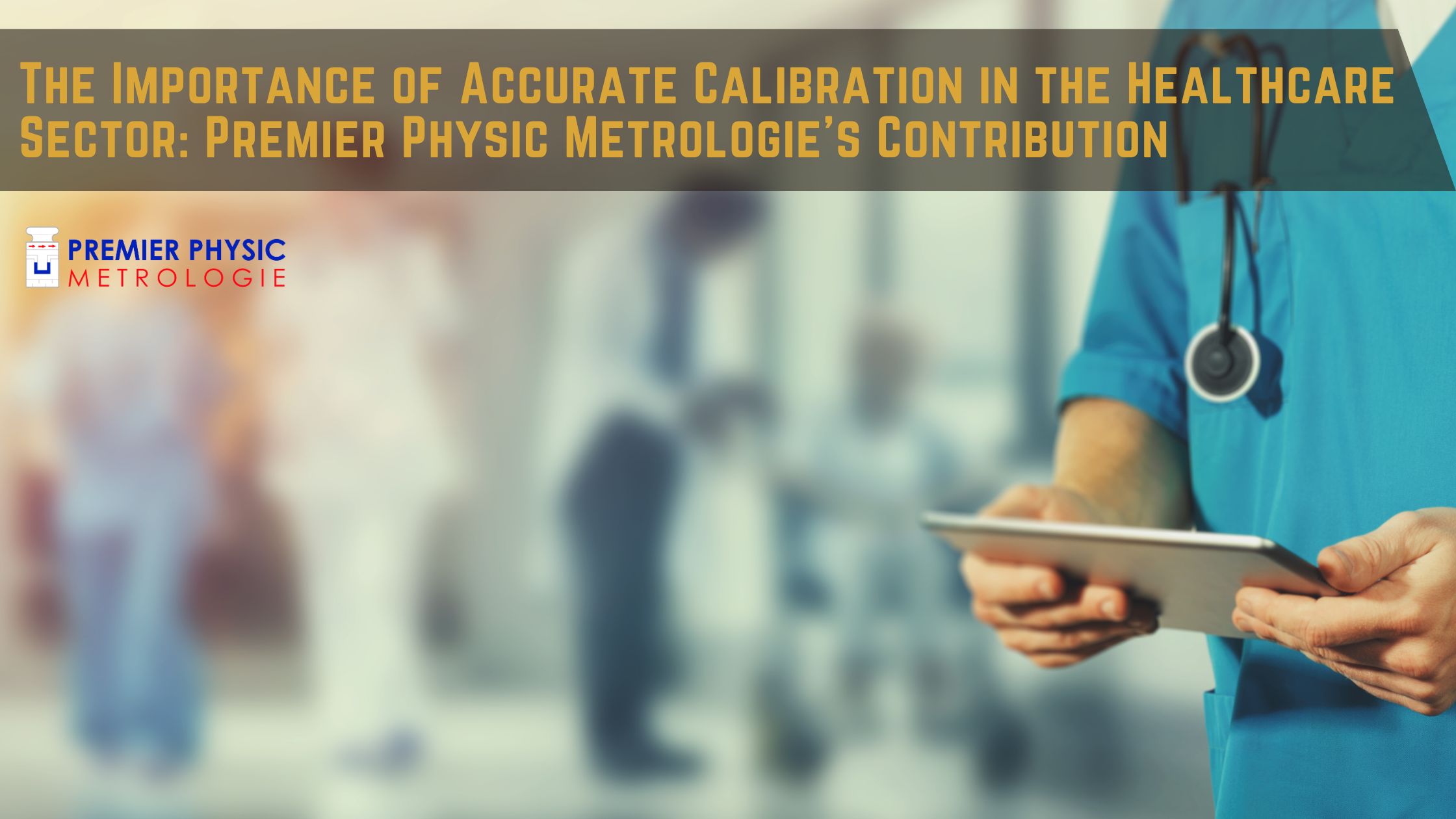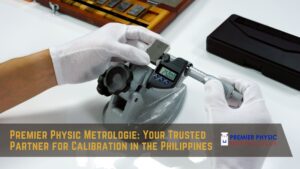Introduction
In the healthcare sector, precision is everything. From diagnostic tools to therapeutic equipment, every device used in medical practice must function with absolute accuracy to ensure patient safety, reliable outcomes, and overall healthcare quality. Whether it’s a thermometer measuring body temperature, an MRI scanner diagnosing a complex condition, or a blood pressure monitor checking vital signs, the accuracy of these devices is crucial.
This is where calibration comes into play. Calibration is the process of adjusting and verifying the precision of an instrument by comparing it to a known standard. In healthcare, where even the smallest margin of error can have significant consequences, accurate calibration is not just important—it’s imperative. Inaccurate readings can lead to misdiagnoses, inappropriate treatments, and even endanger patients’ lives.
Premier Physic Metrologie (PPM) is a leader in the field of calibration services, providing top-tier solutions to the healthcare industry. With their expertise, healthcare facilities can ensure that their instruments are consistently delivering accurate results, safeguarding both patient outcomes and the integrity of medical practices.
In this article, we will explore the importance of accurate calibration in the healthcare sector, the risks associated with poorly calibrated equipment, and how Premier Physic Metrologie’s contributions are making a significant impact on healthcare quality and safety.
The Crucial Role of Calibration in Healthcare
1. Ensuring Patient Safety
Patient safety is the top priority in healthcare. Accurate calibration is fundamental to achieving this goal. Medical instruments and devices are used daily to assess, diagnose, and treat patients. If these devices are not properly calibrated, the consequences can be severe. For instance:
- Blood Pressure Monitors: A miscalibrated blood pressure monitor could lead to incorrect readings, potentially resulting in either a failure to treat hypertension or the unnecessary administration of medication for a condition that doesn’t exist.
- Thermometers: Inaccurate temperature readings might mislead healthcare providers in diagnosing fever-related conditions, leading to either unnecessary treatment or missed diagnoses of serious infections.
- Glucose Meters: For diabetic patients, an incorrectly calibrated glucose meter can provide inaccurate blood sugar levels, leading to inappropriate insulin dosing and potentially life-threatening complications.
In each of these examples, the stakes are high. Accurate calibration ensures that medical instruments are providing correct readings, which is essential for safe and effective patient care.
2. Enhancing Diagnostic Accuracy
The precision of diagnostic tools is directly linked to the accuracy of patient diagnoses. Whether it’s a basic thermometer or a sophisticated imaging device, healthcare providers rely on these tools to make informed decisions about a patient’s condition.
Consider the following examples:
- Imaging Equipment: Devices such as X-rays, MRIs, and CT scanners must be calibrated to ensure that the images they produce are accurate. Calibration errors could result in images that are too dark, too light, or distorted, potentially leading to incorrect diagnoses or the need for repeat procedures, which expose patients to additional radiation.
- Laboratory Instruments: Equipment used in clinical laboratories, such as spectrophotometers and analyzers, must be calibrated to produce reliable test results. An uncalibrated instrument could lead to erroneous lab results, misinterpretation of data, and incorrect medical decisions.
Premier Physic Metrologie plays a critical role in the calibration of these devices, ensuring that healthcare providers can trust the accuracy of their diagnostic tools.
3. Maintaining Regulatory Compliance
The healthcare industry is heavily regulated to ensure the safety and well-being of patients. Regulatory bodies such as the Food and Drug Administration (FDA) and the Department of Health (DOH) in the Philippines have strict guidelines that healthcare facilities must follow regarding the calibration of medical devices.
Regular calibration is a requirement to comply with these regulations. Failure to adhere to calibration standards can result in legal penalties, loss of accreditation, and damage to a facility’s reputation. By partnering with Premier Physic Metrologie, healthcare facilities can ensure that they meet all regulatory requirements, avoiding the risks associated with non-compliance.
4. Extending the Lifespan of Medical Equipment
Accurate calibration not only ensures the precision of medical devices but also extends their operational lifespan. Regular calibration helps identify and rectify potential issues before they lead to significant malfunctions or the need for costly repairs.
Medical equipment is a substantial investment for healthcare facilities. By maintaining regular calibration schedules with a trusted provider like Premier Physic Metrologie, facilities can protect their investment, reduce downtime, and avoid the high costs associated with equipment failure or replacement.
The Risks of Poorly Calibrated Equipment
The importance of accurate calibration cannot be overstated. When medical equipment is not calibrated correctly, the risks are substantial and can affect various aspects of healthcare delivery. Some of the most significant risks include:
1. Misdiagnosis and Incorrect Treatment
One of the most serious consequences of poorly calibrated medical equipment is the risk of misdiagnosis. A diagnostic tool that provides inaccurate readings can lead to incorrect diagnoses, which in turn result in inappropriate treatments. For example:
- False Positives/Negatives: An uncalibrated imaging device could produce false positives or negatives, leading to unnecessary procedures or missed diagnoses.
- Medication Errors: Inaccurate readings from devices like infusion pumps could result in incorrect medication dosages, which can have life-threatening consequences.
2. Compromised Patient Trust
Patients trust healthcare providers to deliver accurate and reliable care. When that trust is compromised due to inaccurate diagnoses or ineffective treatments caused by faulty equipment, it can damage the patient-provider relationship and the facility’s reputation. Patients may lose confidence in their care providers and seek treatment elsewhere, resulting in lost business for the healthcare facility.
3. Financial and Legal Repercussions
In addition to the human cost, the financial and legal implications of using poorly calibrated equipment are significant. Facilities that fail to maintain proper calibration can face lawsuits, penalties, and a loss of accreditation. These legal and financial repercussions can be devastating for healthcare providers, leading to substantial costs and reputational damage.
4. Inefficient Use of Resources
When equipment is not accurately calibrated, it often requires additional testing, repeat procedures, or unnecessary interventions to confirm or correct initial findings. This inefficiency leads to wasted resources, increased patient stress, and higher operational costs. By ensuring that all equipment is properly calibrated, healthcare facilities can optimize their use of resources and improve patient care.
Premier Physic Metrologie’s Contribution to Healthcare Calibration
Premier Physic Metrologie (PPM) is a trusted provider of calibration services, offering expertise that is essential for maintaining the accuracy and reliability of medical devices in the healthcare sector. PPM’s contribution to healthcare calibration is multifaceted and includes the following key areas:
1. Comprehensive Calibration Services
PPM offers a wide range of calibration services tailored to the specific needs of the healthcare industry. From diagnostic equipment to therapeutic devices, PPM provides precise calibration that meets industry standards and regulatory requirements. Their services cover a broad spectrum of medical devices, including:
- Diagnostic Instruments: Thermometers, blood pressure monitors, glucose meters, imaging equipment.
- Laboratory Equipment: Centrifuges, spectrophotometers, analyzers.
- Therapeutic Devices: Infusion pumps, ventilators, defibrillators.
By providing comprehensive calibration services, PPM ensures that healthcare facilities have access to accurate, reliable, and well-maintained equipment.
2. Adherence to International Standards
Premier Physic Metrologie adheres to international calibration standards, such as ISO/IEC 17025, ensuring that their services meet the highest levels of precision and reliability. Compliance with these standards is essential for maintaining the integrity of calibration processes and delivering results that healthcare providers can trust.
3. Regular Calibration Schedules
PPM works closely with healthcare facilities to develop and maintain regular calibration schedules. These schedules are customized based on the specific needs of the facility and the type of equipment in use. Regular calibration is critical for ensuring ongoing accuracy, preventing equipment drift, and avoiding the risks associated with poorly calibrated devices.
4. Detailed Documentation and Reporting
Accurate documentation is a cornerstone of PPM’s calibration services. For every calibration performed, PPM provides detailed reports that include the equipment’s calibration history, the methods used, the results obtained, and any recommendations for future actions. This documentation is essential for regulatory compliance, audits, and ongoing quality assurance.
5. Expert Technical Support
Premier Physic Metrologie’s team of highly trained technicians and engineers provides expert technical support to healthcare facilities. Whether it’s troubleshooting an issue, providing guidance on calibration best practices, or offering advice on equipment maintenance, PPM’s technical support team is available to assist healthcare providers in optimizing their equipment’s performance.
6. Customized Solutions
Recognizing that every healthcare facility has unique needs, PPM offers customized calibration solutions that are tailored to the specific requirements of each client. This personalized approach ensures that calibration services are aligned with the facility’s operational goals, regulatory obligations, and patient care standards.
The Future of Calibration in Healthcare
As medical technology continues to evolve, the need for accurate calibration will only increase. Advances in digital health, telemedicine, and wearable medical devices are introducing new challenges and opportunities for calibration in the healthcare sector. Premier Physic Metrologie is at the forefront of this evolution, continually enhancing its services to meet the demands of modern healthcare.
1. Integration of Digital Health Tools
With the rise of digital health tools, such as mobile health apps and connected medical devices, calibration now extends beyond traditional equipment. Ensuring the accuracy of these tools is crucial for maintaining the quality of care provided through digital channels. PPM is investing in new calibration methodologies and technologies to support the calibration of digital health tools, ensuring that they deliver reliable data and outcomes.
2. Support for Telemedicine
Telemedicine has become an essential component of healthcare delivery, especially in the wake of the COVID-19 pandemic. Calibration plays a vital role in ensuring that the devices used in telemedicine, such as remote monitoring tools, are accurate and dependable. PPM is working to develop calibration services that support the unique needs of telemedicine, enabling healthcare providers to deliver high-quality care remotely.
3. Calibration of Wearable Medical Devices
Wearable medical devices, such as fitness trackers, smartwatches, and continuous glucose monitors, are becoming increasingly popular. These devices provide real-time health data that can be used for monitoring, diagnosis, and treatment. Accurate calibration is essential for ensuring that the data from wearable devices is reliable. PPM is expanding its services to include the calibration of wearable medical devices, supporting the growing trend of personalized healthcare.
Conclusion
In the healthcare sector, the importance of accurate calibration cannot be overstated. From ensuring patient safety to maintaining regulatory compliance, accurate calibration is essential for delivering high-quality care. The risks associated with poorly calibrated equipment are significant and can lead to misdiagnoses, incorrect treatments, compromised patient trust, and financial losses.
Premier Physic Metrologie’s contributions to the healthcare industry are invaluable. By providing comprehensive calibration services, adhering to international standards, and offering expert technical support, PPM plays a critical role in ensuring that healthcare providers have the tools they need to deliver accurate, reliable, and safe care to their patients.
As the healthcare industry continues to evolve, the role of calibration will become even more important. With advancements in digital health, telemedicine, and wearable devices, the need for precise and reliable calibration services will only grow. Premier Physic Metrologie is poised to lead the way, ensuring that the healthcare sector remains equipped to meet the challenges and opportunities of the future.



